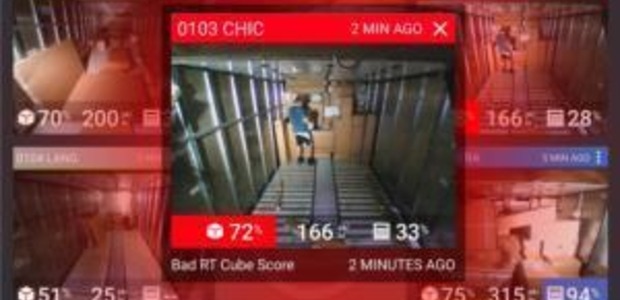advertisement
Can the IoT transform loading operations?
Transporting freight operates at a massive scale in the U.S., most of it hauled by trucks that are the lifeblood…

Transporting freight operates at a massive scale in the U.S., most of it hauled by trucks that are the lifeblood of the American economy. But the trailers those trucks are hauling typically have a load efficiency of 70 to 75 percent, says Tom Bianculli, CTO of Zebra Technologies. The remaining 25 to 30 percent is air.
But smart environments powered by the internet of things (IoT) can change that, Bianculli says. Zebra’s new SmartPack Trailer offering, announced at ProMat 2017 in Chicago, uses sensors on the dock doors of distribution facilities, which peer into each trailer using a combination of 3D depth-sensing technology and a conventional megapixel camera.
The sensors wirelessly feed their data into servers integrated with backend ERP systems, where analytics combine it with other data (e.g., the weight and dimensions of parcels) to optimize loading and to measure load density, trailer fullness, images of loads in progress and number of packages scanned and loaded per hour. The data is fed back to workers on the floor via dashboards on mobile devices.
advertisement
“We’re able to calculate the volumetric load efficiency, or what the industry calls a ‘cube score,’ in real time,” Bianculli says. “Think of it as a 3 percent to 4 percent improvement on load efficiency as a result of being able to collect this data.”
More than 70 percent of all freight tonnage moved in the U.S. is moved on trucks, according to the American Trucking Associations. That’s about 10.6 billion tons of freight annually, using 3.4 million heavy-duty Class 8 trucks, more than 3.5 million truck drivers and 38 billion gallons of diesel fuel.
By giving dock managers greater real-time visibility into the loading process — today dock managers typically manually oversee the process with dock walks multiple times per shift — Bianculli says Zebra can help T&L companies decrease the number of trailers on the road and thus reduce fuel and maintenance costs. In addition, by tracking volumetric efficiency and load rate, SmartPack Trailer can is designed to determine when a load is nearing completion and alert drivers in advance when a trailer is about to be closed out. That means lower dwell time, freeing up the dock more quickly so a new load can begin.
advertisement
“Given the rise of the ‘on-demand economy’ driven by ecommerce and the expectation of instant delivery, the need for solutions that can further optimize speed, accuracy and efficiency of the loading process are vital,” Bianculli says. “The new Zebra SmartPack solution suite brings enterprise asset intelligence to the loading dock, providing transportation carriers with the real-time insights they need to run their operations more efficiently.”
Bianculli notes businesses can also leverage the images captured inside the trailer to track and monitor the lifting techniques of their employees, while also enabling loading dock supervisors to make on-the-spot decisions to help employees work faster and more efficiently. He says this visibility can help reduce worker turnover and injury, theft, loss and damage of parcels with every trailer load.
“In that dock manager’s hand, on a tablet device, we can put all the KPIs that they care about in real time with regard to every trailer,” Bianculli says. “They can see which dock doors are working the best and which are the worst.”
advertisement
Founded in 1969, Zebra built its name on manufacturing and selling marking, tracking and printing technologies ranging from thermal barcode label and receipt printers, RFID smart label printer/encoders and card and kiosk printers. Beginning in 2013, it began pivoting into IoT and machine to machine (M2M) applications with the launch of its Zatar software platform.
For the past several years, it has been helping the National Football League (NFL) turn stadiums into smart environments, providing broadcasters and teams with new and better data. Essentially, Bianculli says, the stadium is the smart environment and the items being tracked are the players on the field.
In January, it unveiled SmartSense for Retail, which is designed to help retailers track inventory and traffic through their sales environments. SmartPack Trailer is its latest offering. Bianculli says that once it’s established, Zebra will seek to extend it to adjacent transport modalities like air transport to build a smarter, more connected distribution network for improved loading operations.